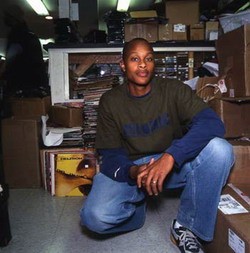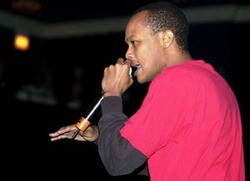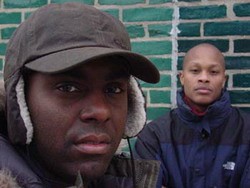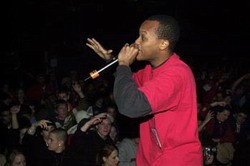Capital D
 Hip-Hop Core: You've always been prone to put your thoughts on wax but on "Insomnia" you fully immersed yourself into politics and social awareness. What decided you to do that?
Hip-Hop Core: You've always been prone to put your thoughts on wax but on "Insomnia" you fully immersed yourself into politics and social awareness. What decided you to do that?
capital D: Many of the situations in the world seem to be getting worse at a rapid rate. When the world's most powerful country states that it can invade any other country on earth because it perceives it to be a threat, then it's way past time to speak out in a forceful manner to counter the madness.
HHC: How do you manage not to drown the music in the message considering that you wanted to put a lot of information in your lyrics for this particular album? It's hard to "edutain" while still making interesting music, isn't it?
D: I don't think so, I think we get tricked into thinking that something is either fun or it's beneficial. But music can be like exercise or playing sports…both fun and beneficial. With that said, when I do music I make sure that the music makes people move and affects them emotionally. Even when I'm writing about serious topics I try to keep it in the front of my mind that the music has to have soul.
HHC: In your lyrics, one can often feel this underlying idea that there is a conspiracy going on to keep people in a state of ignorance. Like in "Start The Revolution", where you say about America "she ain't fighting poverty, she's fighting the poor & every couple years she'll just declare a new war". What is your global view of this high-level conspiracy and how can we fight it on our level?
D: I don't necessarily think that it's a conspiracy. I don't buy into conspiracy theories. I think it's very obvious and open. We are just too caught up in our daily grinds to step back and notice the direction that we are moving. And we don't ask ourselves the same questions that we ask of others…we don't expect the same from ourselves as we expect from others. So if we want to fight the so-called conspiracy we have to step back and get some perspective on the bigger picture and then change our own lives to move ourselves in the direction that we think is correct.
HHC: You're very critical about your own country on "Insomnia"… How does it feel being an American nowadays?
D: I've always felt like a bit of a stranger here. That's just a part of my up-bringing…being black in a predominantly white suburb, etc. But the polarization in this country as of late is extreme. The fear and distrust amongst people is really noticeable. As far as being critical of my own country, I don't think that America is to blame for everything in the world and I'm glad that I live here. But I have a responsibility to use my ‘freedoms' to present a perspective and a reading of history that does not get much airtime because it challenges our country's self-image.
 HHC: In your opinion, why is it that for the most part hip-hop artists don't seem to be concerned with politics anymore? What has changed since the Public Enemy days?
HHC: In your opinion, why is it that for the most part hip-hop artists don't seem to be concerned with politics anymore? What has changed since the Public Enemy days?
D: We didn't behave strategically in the early 90s. We had a lot of political hip-hop, but we never took ownership over the art (over the record labels, marketing companies, radio stations, record stores, etc.). And it's only so long that you can diss the very system and channels that you are reliant on. We should have become more independent more quickly and we're still reaping the whirlwind for that mistake.
HHC: Nevertheless, since the beginning of the war on Iraq and the revelations about Bush's links with Saudi Arabia, there has been a real reaction in the hip-hop community with artists recording tracks aimed at the president (Bigg Jus, Illogic, Mac Lethal, Immortal Technique, Cadence, Danger Mouse & Jemini, The Beastie Boys…). How do you feel about that? Is there still hope for a larger awakening of the minds?
D: There's always hope. A lot of people in hip-hop are educated and involved. We just have to create more independent channels so that we can be heard in a direct, authentic way.
HHC: Are black people still scared of revolution or have they just forgotten about it?
D: I think fear is and has been the number one obstacle for black people in America . We cover up our fear by acting overly tough. But with that said I don't think a lot of people (black, white or whatever) have thought long and hard on what they really want out of life in a deep way. And until we do that we don't even need to talk about revolution. We need to start the revolution by shaping the world in a way that we envision it. But first we have to develop vision.
HHC: Do you really think that "Armageddon is imminent"?
D: It's always imminent for us on a personal level. When we die and we are questioned, if we don't have the correct answers, then there is literally hell to pay. So on a personal level, our death and judgment is always imminent.
HHC: You say you're scared of "isms". Materialism for instance. But, in the end, money is not the problem. It's what you make of it that counts, isn't it?
D: Review your own question. I didn't say I was scared of money, I said I was scared of Materialism. Money and Materialism are not the same thing. Money is just a tool. Materialism is a value system. It's the insatiable quest for money and possessions, and that is a dangerous thing.
 HHC: Your production style has definitely evolved in the past few months. The production on the album is a lot more hard-hitting and the tempos are more upbeat than previously. Was it something that you decided to do consciously or did it just came out that way from being angry?
HHC: Your production style has definitely evolved in the past few months. The production on the album is a lot more hard-hitting and the tempos are more upbeat than previously. Was it something that you decided to do consciously or did it just came out that way from being angry?
D: I've always made different styles of music. The first All Natural 12-inch had “50 Years” as the A-side and “MC Avenger” as the B-side. And my first solo 12-inch had a jazzy A-side (“Que Sera Sera”) and a uptempo B-side (“U Ain't Ready”). So it's not really anything new. But this album is the first time I put an entire collection of aggressive beats together, and that was something I did consciously.
HHC: Yet, you've decided to include a few instrumental tracks over the length of the album. What was your goal?
D: Again I want to be versatile and have different styles of music. Also the instrumentals give the ear a break. I didn't want the album to be one-dimensional. Plus it was important for me to end it on a hopeful note with the songs “Iman” and “Transformations” because I have faith and anger is just a small part of who I am.
HHC: Was it a natural progression for you to totally produce this second solo LP without the help of anybody?
D: If you go back and read the production credits on the first All Natural album, I virtually produced that entire album except for 4 songs. But I never really advertised myself as a producer. On this album, because I had a particular mission I wanted to accomplish lyrically, I wanted to make sure that all the beats fit my purpose for the album. Plus it's just easier for me. I can make a beat, write a rhyme and record it in one day without even leaving the house.
HHC: What's the difference between a capital D album and an All Natural album in your opinion?
D: Good question. I think that both change with time. My solo albums are more personal to me. Whatever I need to say or express from a personal standpoint. I'll take more chances on my solo albums because I really don't care what anybody thinks. With All Natural I care what Tone thinks. Those albums are about our friendship and our common interests and perspectives. Even if I do a beat and write the rhyme, the song may be a All Natural song because something in the beat or the rhyme comes from the both of us and not just from me. But both All Natural albums and my solo albums continue to grow and change. My next solo album will be very different from “Insomnia”.
HHC: What inspired you to use this communist imagery for the design and layout of "Insomnia"?
D: That was our graphic designer's idea (Taaron Silverstein). At first I didn't want to go there, but she convinced me…and when she showed me the mockups I thought the intensity, the distressed photo and the color scheme all fit the album.
HHC: Can you give us some information about the Hip-Hop 101 association with whom you're working? Who created it and what's the goal of this association?
D: The name of the organization is IMAN (Innercity Muslim Action Network). It's a community organization on Chicago 's southwest side that does a number of programs such as computer and job skills training, a Latino day laborer campaign, prison outreach and a free health clinic. The Hip-Hop 101 program was something that they approached me about doing something to bring kids from all over the city together to learn about hip-hop history, the art of rhyming, poetry, etc. We hope to do it again in the future, but time commitments make it difficult to do right now.
HHC: How does it feel being a Muslim in post-9/11 America ?
D: Wonderful. My head is clear and it helps me keep a focus on what's important. Of course it forces me to speak out against injustice perpetrated against Muslims and against injustice perpetrated by Muslims. But that responsibility is a blessing.
HHC: What decided you to involve yourself in a legal assistance foundation for poor people?
D: That's one of the reasons I went to law school was to use the degree to help people. I want to do a lot of different things with the degree, especially get an understanding of business law, but doing real work for poor people is something that I continue to do as well.
HHC: What valuable lessons have you learned during your recent law studies?
D: It's funny, one thing I learned is just how ingenious the U.S. Constitution is. As a document it is really intelligent and well put together. And that brought me back to the fact that it's human beings that ultimately give life to the documents that we claim to live by. If we don't live up to the ideals of the words, then the document becomes lifeless (whether that document is the constitution, a book or song lyrics).
HHC: How did you feel finally being able to release albums by Iomos Marad and Daily Plannet? It was a long time coming for DP.
D: It let me know that we were finally making the moves we've be planning to make. I was really happy for Daily Plannet. Those are my brothers and to hear that album I can really hear the growth in them as men and as fathers. Same with Iomos, his album shows the direction that he needs to move as a man. And that's what we all need to be about.
 HHC: By the way, is it true that Iomos still plays drums in the subway? How did you first meet him?
HHC: By the way, is it true that Iomos still plays drums in the subway? How did you first meet him?
D: I'm not sure to tell the truth. I met him at a show he did in Chicago at the HotHouse. He ripped it and I just introduced myself to him and gave him respect. I had no intentions of working with him, I just wanted him to know that he was on something.
HHC: Speaking about that, you've done productions for your Family Tree colleagues. Do you work differently when you're doing tracks for somebody else than yourself?
D: Sometimes. Some of the beats that make it on to other albums were joints I intended on rocking but didn't for whatever reason. Sometimes I'll make something and the beat will just be better for them than it is for me. And once in a while I'll sit down to make a beat for a specific person. But usually I just try to make dope beats and whoever ends up with it, it's cool.
HHC: Do you plan to do another Family Tree album? Will the Molemen be involved?
D: We're working on it right now. Just last week Tone sent an email out to rally the troops together. We're doing it with the Jungle Brothers. There will be some Molemen beats on there.
HHC: Now that No I.D. has taken a more mainstream route to success, is there any chance that we will ever hear you on one of his productions again?
D: Maybe.
HHC: One of the most poignant tracks out of "Second Nature" was 'Godspeed'. What gave you the idea of this long intro without any words and with Tone B. Nimble occupying the space?
D: The long intro really sets the mood and lets Tone do his thing. In a way the song is about reflecting and so the intro sets that up where you can just get into the song without being bombarded with lyrics. Plus I love that beat so I had to let it ride for a minute!
HHC: How do you feel about your European audience?
D: I wish I could see them more often. I miss Europe . I used to love coming over there for shows. The buildings, the cultures and the people and their senses of humor. I have great memories of Europe and I want to come back. But if not then at least I have the memories.
HHC: I've heard that you plan to release a new book alongside the release of "Insomnia". Could you tell us a few words about that?
D: There won't be a book anytime soon. What I'm doing now is releasing essays on our website (www.allnaturalhiphop.com) every couple of weeks or so. But a full book is still a little ways off.
HHC: Could you tell us a few words about your previous book "Fresh Air" by the way? For people that are interested in reading it, where can they find it?
D: We plan to re-release it in the future. Just have to get our scratch together. It was a fun book to write and if I had more money I'd put something like that with every album. For those who don't know the first printing of All Natural's first album was sold with a short book of essays, cartoons and short stories. I'm still pleased about having done that and plan to do it again sometime.
HHC: What do you think about other Chicagoan artists and crews such as Twista, Galapagos 4, The Opus or the Nacrobats?
D: Pugslee Atomz is especially fresh. Chicago has a lot of talent that's always on the verge of taking that next step. I want to see some more people who do things the right way make it to the next stage…whether they're from my crew or not. There's a lot of people who have stayed consistent in Chicago who deserve more shine.
HHC: Something that always struck me about the Chicagoan hip-hop scene is that there are not a lot of inter-crews collaborations. Apart from working with the Molemen or doing compilations, most rappers tend to stick with their own crew the rest of the time. Why is that in your opinion?
D: I don't know. Part of it may be that crews in Chicago can be massive in their own right. With our crew there's a lot of talent before I even have to step outside and work with anybody else. I feel comfortable working with my fam. I do work with other people that ask me, but I'm sure a lot of them feel the same way…they are comfortable working with their fam as well.
HHC: What can we expect from the next All Natural album "Vintage"? Can you give us some details about it?
D: We hooked up with the Jungle Brothers and El da Sensai, plus Daily Plannet and Iomos. It's a real soulful hip-hop album. It's dope, that's all I can say.
HHC: What's up and coming for All Natural Inc and its affiliates?
D: Daily Plannet is dropping another 12-inch and I'm dropping a second single off of “Insomnia”. As far as albums go, the focus right now is on pushing "Insomnia" and then gearing up for the All Natural album. I'm really looking forward to it. My album was really a side-thought compared to the All Natural album. It's gonna be fresh. Plus we're working with a couple of other Chicago groups: Pacifics and The Primeridian, so when they're ready to roll we'll drop them as well.
HHC: How do you feel about the equilibrium between religion and music that you've achieved right now?
D: I think equilibrium is a good word. Islam colors everything that I do now. It's a natural way of life that, although it changes you, it doesn't need to be proselytized or forced on people. It's simple…the Creator is greater than any human being, idea or race, etc. So submit to the Creator and nothing else. Allah says there is no compulsion in religion, so it's easy to find that ‘equilibrium' where you place other things such as music and/or politics within the lens of Islam. I just have to keep becoming a better Muslim, that's all.
HHC: Is there anything you'd like to add?
D: Thanks for the interview and the questions. I can tell you know about us and what we're trying to be about. Much appreciation to you and to everybody who appreciates All Natural, Inc. Salaam.
Interview by Cobalt & Bachir
October 2004